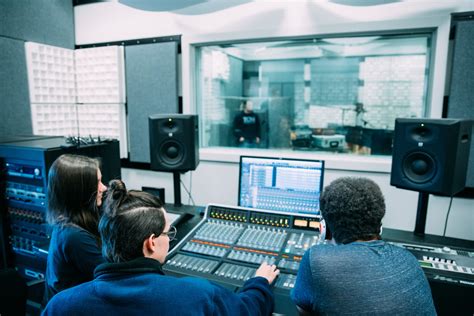In today's fast-paced music industry, staying ahead of the curve requires more than just a passion for music. With the rise of music technology, professionals are expected to be proficient in a wide range of skills, from recording and producing to marketing and distribution. For students looking to break into the industry, pursuing a music tech minor can be a game-changer. Here are five ways that music tech minors can boost your career:
The music industry is becoming increasingly dependent on technology. From recording software to social media platforms, understanding the latest tools and trends is essential for success. By pursuing a music tech minor, students can gain hands-on experience with industry-standard software and hardware, giving them a competitive edge in the job market.
Improve Your Skills in Music Production

Music production is a key aspect of the music industry, and having skills in this area can open up a wide range of career opportunities. With a music tech minor, students can learn the ins and outs of music production software, such as Ableton Live, Logic Pro, and Pro Tools. They'll also gain experience with recording and editing techniques, allowing them to produce high-quality recordings.
Key Skills for Music Production
- Understanding of digital audio workstations (DAWs)
- Familiarity with recording and editing software
- Knowledge of effects processing and mixing techniques
- Ability to work with virtual instruments and plugins
- Understanding of acoustics and studio design
Enhance Your Career in Music Business and Marketing

The music industry is a business, and understanding the marketing and business side of things is crucial for success. With a music tech minor, students can learn about the latest trends and technologies in music marketing, including social media promotion, email marketing, and digital distribution. They'll also gain insights into the music industry's business side, including copyright law, publishing, and licensing.
Key Skills for Music Business and Marketing
- Understanding of music industry business models
- Familiarity with music marketing and promotion strategies
- Knowledge of social media platforms and email marketing tools
- Ability to analyze data and track engagement metrics
- Understanding of copyright law and publishing agreements
Explore Career Opportunities in Music Technology

The music technology field is rapidly expanding, with new career opportunities emerging all the time. With a music tech minor, students can explore careers in areas such as:
- Music software development
- Audio engineering and acoustics
- Music data analysis and visualization
- Virtual and augmented reality music experiences
- Music technology entrepreneurship
Key Skills for Music Technology Careers
- Programming skills in languages such as Python, Java, or C++
- Familiarity with music technology software and hardware
- Understanding of audio engineering principles
- Knowledge of data analysis and visualization tools
- Ability to think creatively and develop innovative solutions
Network and Collaborate with Music Industry Professionals

One of the most valuable aspects of pursuing a music tech minor is the opportunity to network and collaborate with music industry professionals. Students can gain access to industry events, conferences, and workshops, where they can meet and learn from experienced professionals in the field. They can also collaborate on projects with other students and industry professionals, building their portfolio and making valuable connections.
Key Skills for Music Industry Networking
- Ability to communicate effectively with industry professionals
- Understanding of industry trends and technologies
- Familiarity with music industry business models and practices
- Ability to work collaboratively on projects
- Understanding of intellectual property and copyright law
Stay Ahead of the Curve with Continuing Education

The music technology field is constantly evolving, with new tools and trends emerging all the time. By pursuing a music tech minor, students can gain a solid foundation in music technology principles and practices, as well as the skills and knowledge needed to stay ahead of the curve. They'll also have access to continuing education resources, such as online courses and workshops, to help them stay up-to-date with the latest developments in the field.
Key Skills for Music Technology Continuing Education
- Ability to learn new software and hardware tools quickly
- Understanding of emerging trends and technologies in music technology
- Familiarity with online learning platforms and resources
- Ability to adapt to new situations and challenges
- Understanding of the importance of lifelong learning in the music technology field
Gallery of Music Technology Careers






Now that you've learned about the benefits of pursuing a music tech minor, it's time to take the next step. Whether you're a music industry professional looking to upskill or a student looking to break into the industry, a music tech minor can help you achieve your goals.
What is a music tech minor?
+A music tech minor is a secondary field of study that focuses on the technical aspects of music production, marketing, and business.
What kind of careers can I pursue with a music tech minor?
+A music tech minor can lead to careers in music production, audio engineering, music marketing, music business, and more.
Do I need to have musical experience to pursue a music tech minor?
+No, you don't need to have musical experience to pursue a music tech minor. However, having some musical knowledge can be beneficial.
